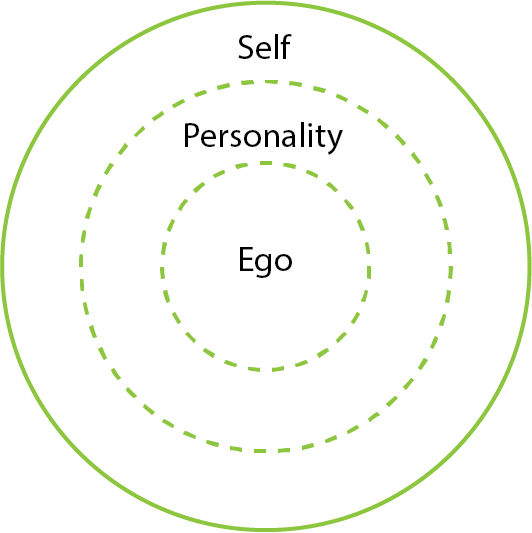Introductory Concepts
Personality, Ego and Self
Personality Type
Personality type indicates a particular structure of consciousness. In order to be mentally stable, we all need such an orientation. If we didn't have one, there would be no such thing as personal growth. We would have nothing to grow from. None of us would be functional or have any kind of mental organization.
Dario Nardi's brain scans have shown the first biological basis for personality type as developed by Isabel Briggs-Meyers. According to our personality type, we use distinctly different pathways in our brains from those of other types. That is, people of one personality type will have a brain that works very different from someone with another personality type.
The Ego
Our ego is essentially our self concept. Learning about our personality type can be one way to help develop a healthy ego that:
- Is based on accurate self-reflection.
- Gives us a sense of real relatedness with ourselves and others.
- Is tapped into our authentic motivations.
- Is positive and compassionate.
- Is flexible and open to growth.
If our egos are misaligned with how our brains actually work, that’s a set up for a dysfunctional ego. For example, this can happen when we don’t feel safe to be honest with ourselves. In this case, we develop our self-concept based on who we think we should be rather than how our brains work.
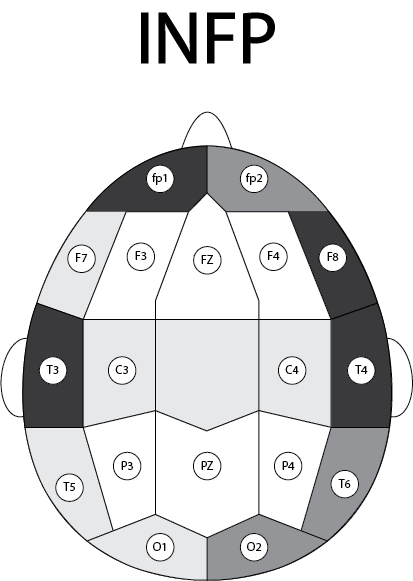
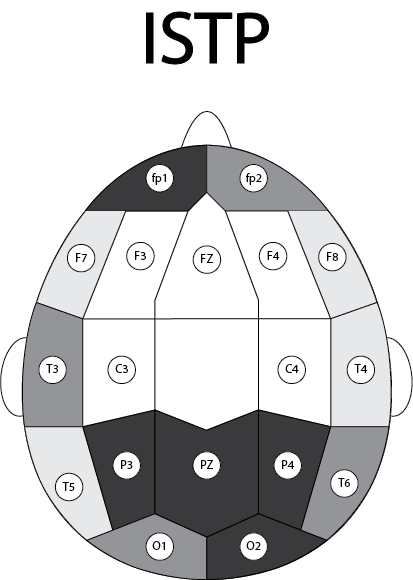
In the brain scans above from Dario Nardi's book Neuroscience of Personality, the darker areas show the most mental activity for a certain personality type. What happens if an INFP thinks they should be like an ISTP? Ouch! The scans reveal that in some of places where the ISTP is most active, the INFP has little to no activity.
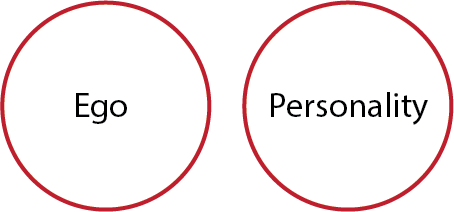
If an INFP thinks they should be more like an ISTP, one could say it presents a mismatch between ego (self-concept) and personality type (actual structure of consciousness). As you might imagine, this could be very stressful and confusing. If that mismatch is corrected and the INFP's self-concept becomes more aligned with the reality of having an INFP brain style, then we have a less stressful and probably more productive situation. Now the ego can be aligned with the personality and we're on our way to greater levels of happiness. Once we experience this ego/personality alignment, we have a platform for growth instead of inner conflict.
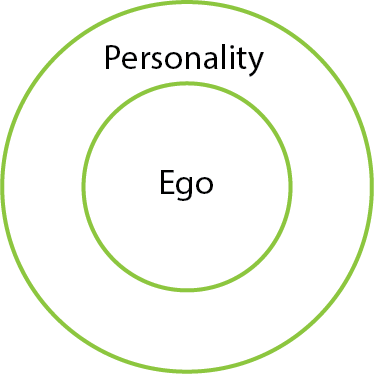
The Self
In contrast to the ego, Carl Jung discussed the idea of the Self which represents our known and unknown potential. The Self includes both conscious and unconscious parts of ourselves. Therefore, the Self includes parts of ourselves we may consciously consider as "how other people are, but not us". Once we get the idea that who we are is much greater than our conscious standpoint, we have a place to grow into. We can stretch into the unknown parts of ourselves without feeling threat.
A healthy ego stays rooted in the personality structure as an orientation but does not confine itself to that structure. If one's ego rigidly adheres to the idea that "I am an INFP and nothing more", then that INFP personality label will start to feel like a box one is trapped inside of. This is because, as human beings, we are all much bigger than any one label could possibly describe.
Carol Dweck’s research on mindset explores how any fixed idea of ourselves, whether positive or negative, tends to limit our capabilities. When we act and think from fixed self-concepts, we prevent our brains from functioning as well as they could. This is somewhat poignantly illustrated in Dweck's brain scans of people in a growth mindset versus people in a fixed mindset.
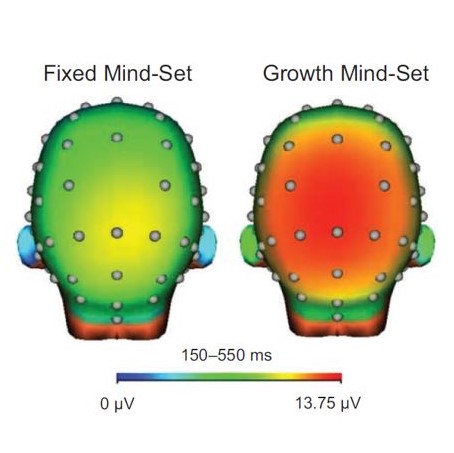
In the illustration above, from Carol Dweck's research, green indicates brain activity while red indicates inactivity. Both people were asked a question. As you can see, the brain of the person in a fixed mindset was using very little of their brain when answering the question.
Dario Nardi's brain scans show people can start in young adulthood with a pattern indicative of one personality type, and then their brains are able to keep evolving and branching out from that initial pattern, into a richer more comprehensive network. This type of brain growth can't happen if a person is stuck in a fixed mindset.
Going back to the INFP/ISTP example, a person of an INFP type, recognizing their INFP orientation, may be able to entertain that they might be able to do certain ISTP kinds of things, like fixing a lawnmower. Through curiosity, self-knowledge, and self-compassion, an INFP type might just be able to pull it off, without fooling themselves that they are now like an ISTP.
Social Implications
In terms of interpersonal dynamics, the idea that we all have a Self that embraces all personality types is also very practical. We've all met people who seem to be completely unlike us, and this can be a bit nerve wracking. What do I say to a person with whom I have nothing in common? But it gets a lot more extreme than that:
Brain imaging studies have shown repeatedly that with people “like us,” we become kinder and extend ourselves more to care for their welfare. They are seen as a member of our clan, fellow inhabitants of our cave, and we protect them from the harm we’ve been primed to fear. If, on the other hand, the people are “not like us,” we are more likely to treat them with disdain and disregard - as if they were potential enemies and perpetrators of harm. We banish them more easily, create more intense punishments for any wrong-doing, and judge them more harshly. - Daniel Seigel
We tend to see people "unlike" us as less human. This, of course, leads us to all kinds of problems. When we see any person and recognize they are just as human but perhaps with a different orientation, this becomes a starting point for relating, for Self-realization, and for lowering the collective anxiety level. If you're working with someone very different from you on a team, you can start leveraging each other's unique intelligence appropriately. If you're married to a very different person (opposites often attract) or a parent to that very different person, then you have a much healthier place from which to start. You might say something like, "What's your view from over there?" rather than, "Where the @#$% are you coming from? Are you nuts?" The typical "I'm right, you're wrong" posturing can relax, and we can all learn together and start to expand our own views via those different people we might be more apt to condemn.
Unless we embrace both our conscious and unconscious aspects (the Self), we are not only doomed to inner conflict, we are constantly pitted against others that represent the unconscious parts of ourselves. Hence Jung's quote:
"Everything that irritates us about others can lead us to an understanding of ourselves."

